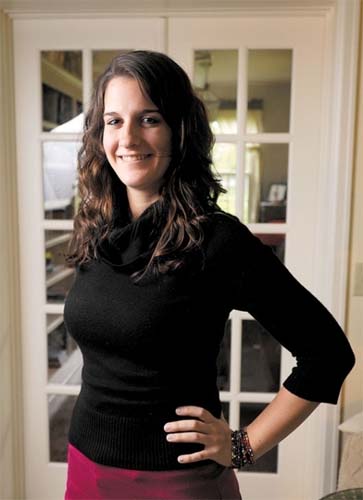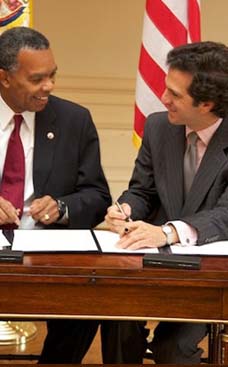
She spent two months with a family in the northwest part of the country learning Pulaar, one of the more prevalent tribal languages of the country and used primarily in the south, where she eventually would be posted. "I had a phenomenally wonderful experience," she said, despite the rough emotional beginning. "I had three sisters in their 30s and one pulled me over to where they were cooking and she repeated over and over 'this is this, this is this.' " Few everyday experiences escaped being turned into a language class. "Before I went to bed, one of my brothers wouldn't let me go to my room until I learned how to count to 10, or learn a simple phrase, how to construct a sentence, or say, 'I want to go to bed.' They were very good." The training served her well in Sarre Habba, her assigned village where no one spoke anything but Pulaar. She quickly gained the trust of the women by pulling her weight with chores: hauling water for drinking and bathing, doing her own laundry, pounding grain, working in the garden.
Jessica Wyatt recently returned from Senegal after service in the Peace Corps
"Give a man a fish ..."
5/24/2010
By GORDON D. FIEDLER JR. Salina Journal
Soon after Jessica Wyatt set foot in Africa as a Peace Corps volunteer, she found herself a stranger in a strange land. The 25-year-old Salinan wasn't living a Robert Heinlein science fiction novel, but the contrast between Kansas and the western African nation of Senegal was almost as stark as between Earth and Mars.
"When you get there, you're like a little baby," she said. "You can't speak, you can't do anything, you feel awkward all the time, you break things, you cry. I cried a lot."
Fortunately for Wyatt and the villagers she was sent to help, her 18-month experience improved markedly, but at first, she was having second thoughts.
"I was having a horrible day," she said. This was a couple of weeks into the program, and she tapped a veteran volunteer for advice.
"I called him and I said I don't know what to do. I want to go home, but I don't. I know I'm supposed to be here, but I don't. I have no idea what I'm supposed to feel."
He told her to unburden herself on her host family, the folks with whom she was to live for a two-months crash course in language and culture.
" 'Tell them your sad,' " she recalled his advice. " 'You're not doing anyone any favors by hiding your sadness.' "
So she screwed up her courage and blubbered her feelings to her hosts, who rallied and boosted her spirits.
"They dropped what the were doing and attended to my idiotic needs," she said.
By the end, though, she was living in a waddle-and-daub thatched-roof hut with no electricity or running water and a hole in ground for a toilet and facilitating an "agro-forestry" project in a remote village of 100 people.
"I definitely understand agriculture a lot more," she said of her experiences. "I feel like I understand the Third World a little better."
In part, she has a cousin to thank.
After she graduated from Beloit College in 2007 with a degree in anthropology, she was adrift.
"I had nothing to do," she said. "I worked at a symphony as an administrative coordinator, and I decided that was not what I wanted to be doing with the rest of my life."
She does now: She'll be moving to Baltimore to study for a Master of Arts degree in community arts at Maryland Institute College of Art.
But her future was clouded a few years ago.
She had a pleasant experience studying in Scotland her junior year and thought another trip abroad was in order.
"I talked to my cousin," Wyatt said. "She had just gotten back from the Peace Corps in Togo, which is in west Africa."
She told Wyatt that if she felt lost, she should go to Africa.
To Wyatt, the timing seemed right.
"I'm not married, I don't have kids, I don't have debt. Well, why not try?"
The Peace Corps' personal interview was in Denver. In her characteristic bubbly exuberance -- when Wyatt gets wound up, she speaks in exclamation points -- she recounted an abridged version of her session with a Peace Corps official: " 'What do you want to do, where to you want to go?' I said, I want to go to Africa! 'Great! Do you want to plant trees?' Sure! 'OK. Bye!' "
The agency tries to pair volunteers with countries based largely on language ability. Wyatt can't speak Spanish, so that eliminated South America, but she did take French in high school. That was good enough to get her sent to French-speaking Senegal, a country smaller than South Dakota but with about 14 million people.
She spent two months with a family in the northwest part of the country learning Pulaar, one of the more prevalent tribal languages of the country and used primarily in the south, where she eventually would be posted.
"I had a phenomenally wonderful experience," she said, despite the rough emotional beginning.
"I had three sisters in their 30s and one pulled me over to where they were cooking and she repeated over and over 'this is this, this is this.' "
Few everyday experiences escaped being turned into a language class.
"Before I went to bed, one of my brothers wouldn't let me go to my room until I learned how to count to 10, or learn a simple phrase, how to construct a sentence, or say, 'I want to go to bed.' They were very good."
The training served her well in Sarre Habba, her assigned village where no one spoke anything but Pulaar.
She quickly gained the trust of the women by pulling her weight with chores: hauling water for drinking and bathing, doing her own laundry, pounding grain, working in the garden.
Although her initial charge was to help plant trees, she had wide discretion based on community needs.
"When you get into the village, the Peace Corps isn't there. You are there," she said. "You decide, does this village need trees or does this village need nutrients to feed their children who are malnurished."
Thus began a project that moved the village garden closer to the inhabitants and provided water sources in the form of wells, thanks in part to the Salina Noon Rotary Club.
Wyatt spoke to the civic club during a visit in 2009 and explained the village lacked decent water.
"They said, 'We want to give you money!' I said, great!"
Rotary funds enabled the villagers to dig deeper than normal wells and provided the buckets, pulleys and other hardware to draw the water.
"They dig until they get water," Wyatt said of their traditional methods. "And then they stop. Water!"
The problem is that in the dry season, the wells dry up.
This time, they used a pump to remove the water so villagers could dig below the water level. Now, they have water year round.
The water is used for irrigating the garden plots and for household use.
The Peace Corps gives each of its volunteers a large water filter, but that didn't keep Wyatt off the sick list.
"Everybody gets sick, but I was really lucky. I never had anything that needed medical attention. A lot of my (Peace Corps) friends did."
Other than breakfasts of oatmeal sent in care packages from her parents, Wyatt ate the village fare that comprised mostly grains.
"Lunch was usually 99.9 percent rice with either peanut sauce or leaf goop," she said. She wasn't sure what the "leaf goop" was, but it was tasty.
"Sometimes we'd have fish. Sometimes there would be meat, but meat is a very high-end thing."
Legumes were staples. Wyatt said besides oatmeal, a favorite breakfast was bean sandwiches made with local bread.
The village gardens produced okra, tomatoes, mint, cabbages and other greens, but she said the villagers weren't too keen on vegetables. Cabbages, for instance, were grown for sale more than for the table.
Still, despite the apparent bounty, starvation always lurked.
"All the volunteers starve," she said, including her. "There have been hungry days."
One of her volunteer friends was hit particularly hard when domestic animals invaded the village garden.
"I watched (my friend) and her family starve on multiple occasions," she said.
Because the rural Senegalese live so close to the bone, they don't have the luxury of experimentation, either with novel planting techniques or new plant varieties.
However, Wyatt did convince them to grow sunflowers.
"I had this grandiose idea of doing an oil (seed) project, but the timing just didn't work out," she said.
She gave the harvested seed to a friend in the nearby town who had oil seed experience.
"Hopefully, that will work out for him," she said.
Her garden guidance was more fruitful -- and in ways she didn't expect.
"My biggest goal was to try to do everything in a way that could be replicated," she said.
Yet when she had a brief falling out with one of her family members, who developed a competing garden across the road, she was miffed.
"At first, I was mad, but they were doing it by themselves," she said. Subsequently, two other such garden projects started, which is what she'd hope would happen.
"Yes!" she punctuated the air with a vigorous arm pump. "I did a good job!"
She's hopeful for her village's future.
"Part of the goal as a volunteer is to change the mentality and give ownership (to projects.) I'd like to think my project is not going to fail."
nGordon D. Fiedler Jr. can be reached at 822-1407 or by e-mail at gfiedler@salina.com.












